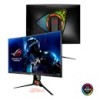Asus ROG SWIFT PG27VQ User Guide - Page 28
Troubleshooting (FAQ), Specifications are subject to change without notice.
 |
View all Asus ROG SWIFT PG27VQ manuals
Add to My Manuals
Save this manual to your list of manuals |
Page 28 highlights
Accessories Compliance and Standards DP cable, HDMI cable, USB cable, power adapter, power cord, Driver and Manual disc, Quick start guide, warranty card, LED projection cover and changeable films, Input/Output port cover CB, CE, CU, CCC, UL/cUL, FCC, RCM, BSMI, VCCI, RoHS, WEEE, J-MOSS, ErP, PSE, CEL Level 1, Windows 7 WHQL, Windows 8.1 WHQL, Windows 10 WHQL, KCC, E-Standby, TUV-Flicker Free, TUV-Low Blue Light *Specifications are subject to change without notice. 3.4 Troubleshooting (FAQ) Problem Possible Solution Power LED is not ON •• Press the power button to check if the monitor is in the ON mode. •• Check if the power cord is properly connected to the monitor and the power outlet. The power LED lights white and there is no •• Check if the monitor and the computer are screen image in the ON mode. •• Make sure the signal cable is properly connected the monitor and the computer. •• Inspect the signal cable and make sure none of the pins are bent. •• Connect the computer with another available monitor to check if the computer is properly working. Screen image is too light or dark •• Adjust the Contrast and Brightness settings via OSD. Screen image bounces or a wave pattern is •• Make sure the signal cable is properly present in the image connected to the monitor and the computer. •• Move electrical devices that may cause electrical interference. Screen image has color defects (white does •• Inspect the signal cable and make sure not look white) that none of the pins are bent. •• Perform All Reset via OSD. •• Adjust the R/G/B color settings or select the Color Temperature via OSD. 3-8 Chapter 3: General Instructions














